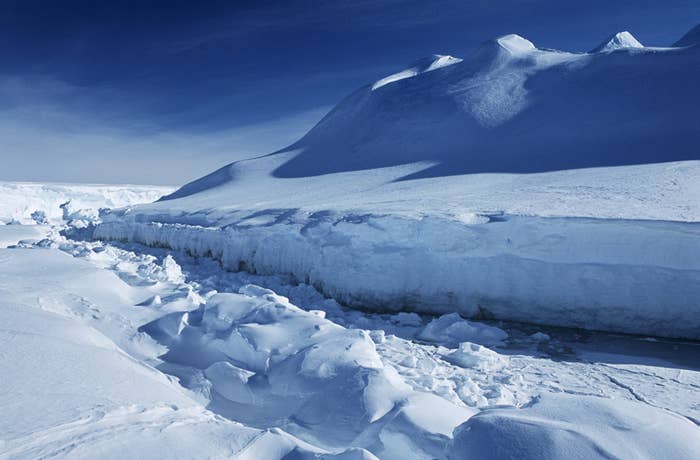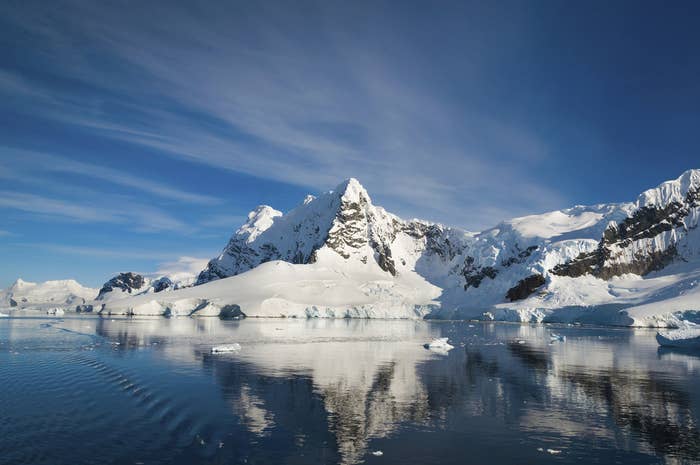
Antarctica's ice sheets are "extremely unlikely" to collapse enough to cause more than a 30cm rise in global sea levels by the end of this century, according to new research from the Open University.
As the world warms, the vast, kilometres-thick ice sheet is expected to grow unstable, causing large parts of it to slide into the ocean. Earlier models said that in the worst-case scenario, the sheet's collapse could cause as much as 50cm or even a metre of sea level rise worldwide; one study, last year, suggested a catastrophic collapse of the sheet could cause a sudden four-metre rise. That is before taking into account the sea level rise from other sources, such as the melting of the Greenland ice cap, or "thermal expansion".
However, the new study – which its authors say is the most robust and precise to date – says that the upper limit is much lower, almost certainly no more than 30cm by the year 2100.
Dr Tamsin Edwards, the Open University physicist who led the research, alongside Catherine Ritz from Université Grenoble Alpes, told BuzzFeed News that there were two main predictions from the model: "One is the most likely outcome, [and the other] is the upper limit, the worst-case scenario."
The most likely outcome, their "peak estimate", is a sea level rise of about 10cm. That is similar to the most likely outcome suggested by the Intergovernmental Panel on Climate Change (IPCC).
However, Edwards said the upper limit was highly uncertain. "There were a few studies that were giving quite pessimistic numbers, like half a metre, a metre."
Climate predictions are inherently uncertain due to the huge number of variables involved. The study attempted to minimise this by running its computer model 3,000 times, each time with slightly different inputs based on real ice-sheet–loss data from west Antarctica.
"There are these known unknowns, about how the ice flows, how it slides," Edwards said. "What the bedrock is like under the ice sheet is really important. So we had 3,000 different versions to reflect what we were uncertain about, and those things we knew the model was imperfect about."

No other studies have tried this, she said. "[Other research has] taken a model and run it once, or a handful of times."
In another attempt to reduce the uncertainty, the researchers began all 3,000 models well in the past, and then compared their results to reality. "What we've done is compare the rates of ice loss in the recent past with what the models predicted," said Edwards. Then they took the most accurate models, and gave them greater weight when assessing their final predictions.
"You squash down the ones that weren't so good, and bump up the ones that were better, and so you get a narrowing of the uncertainty range," said Edwards. "You've got more confidence in your model's predictions."
The west-Antarctic ice sheet collapse is only one factor in the predicted sea level rise. Melting glaciers and the Greenland ice sheet, as well as "thermal expansion" – water expands in volume as it gets warmer – will also have a major impact. One IPCC scenario says there is a 66% chance that the overall sea level rise will be between 42cm and 80cm, with a most likely estimate of 60cm, and the Open University study doesn't change that picture very much. "Our estimate would only be a few centimetres higher," said Edwards.
But there is a small chance that it will be much higher, and much of that uncertainty is due to the Antarctic sheet. "[With] global sea level rise, the ice sheets, the glaciers, the thermal expansion, Antarctica is the most uncertain part," said Edwards. The new research puts a harder limit on global sea level rise, because instead of, perhaps, adding as much as a metre to the worst-case scenario, the Antarctic is very unlikely to contribute more than 30cm by the end of the century.
A 60cm rise in sea level still has the potential to be devastating, especially to poor, low-lying coastal countries such as Bangladesh. Another complicating factor, Edwards said, is that there is no reason to believe that the sea level rise will be uniform: "We really think it won't be. [It depends] on ocean circulation, on the gravity of ice sheets pulling the water and changing its shape."
In the UK, Scotland is rising – and so its relative sea level is falling – because ice from the last ice age has melted, and the reduced weight means it is bobbing up like a cork. "But sea level is going up on the south of the country," Edwards said. "And the regional picture will be based on things like historical records of storm surges, winds, and so on. It gets even more complicated." So while some places may not suffer too badly, others could be far more badly damaged than a rise of 60cm would suggest.
Dr Dominic Hodgson, a researcher with the British Antarctic Survey, told BuzzFeed News the new research marks a "step change" in modelling ice sheet instability. "This one is a definite step forward from the sorts of models that the IPCC has been using," he said. "They've made a real effort to improve the physics in the model and to test it against some of the data from the Amundsen sea sector that is available."
Regarding the high-end estimates based on models suggesting catastrophic ice sheet collapse, he said: "We can't rule them out. In the past there were some pretty rapid jumps in sea level that can only have come from catastrophic collapses of ice sheets. So we know that that sort of thing is possible. But those estimates are not supported by the physics used in this analysis, and the physics used in this analysis is pretty well justified."
The research, he said, will force other researchers to reassess their own models. "It really throws down the gauntlet to other modellers," he said. "There will be other groups around the world that have been giving projections which are either substantially greater or substantially lower, and they will try to publish data which shows a different outcome.
"But because this study has really raised the game in terms of reporting, the other models won't get published unless they adopt a similar level of sophistication."
